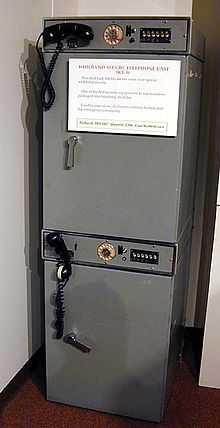KY-3

The KY-3 (TSEC/KY-3) is a secure telephone system developed by the U.S. National Security Agency in the early 1960s. The "TSEC" prefix to the model number indicates NSA's Telecommunications Security nomenclature system.
According to information on display in 2002 at the NSA's National Cryptologic Museum, the KY-3 provided high fidelity secure voice over special wideband circuits known as "4-wire dedicated drops". It was used by executives, diplomats, military leaders and the intelligence community. Some 2500 units were produced between 1965 and 1967 and it was one of the first telecommunication security devices to use transistors packaged into functional modules. The unit was packaged in a grey relay rack cabinet. The KY-3 was replaced by the STU-I and STU-II.
External links
See also
| ||||||||||||||||||||||||||||||||